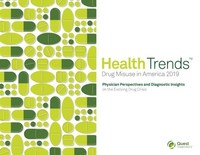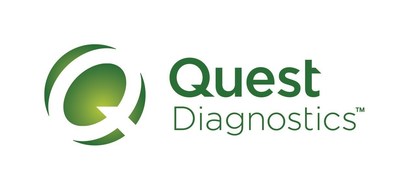Most primary care physicians (62%) fear the opioid drug crisis will be traded for a new prescription drug crisis and nearly three quarters (72%) worry that chronic pain patients will turn to illicit drugs if they do not have access to prescription opioids, according to a new Health Trends™ report from Quest Diagnostics (NYSE: DGX)
| SECAUCUS, N.J., Oct. 16, 2019 /PRNewswire/ -- Most primary care physicians (62%) fear the opioid drug crisis will be traded for a new prescription drug crisis and nearly three quarters (72%) worry that chronic pain patients will turn to illicit drugs if they do not have access to prescription opioids, according to a new Health Trends™ report from Quest Diagnostics (NYSE: DGX). Seventy percent of primary care physicians wish they had more training on how to taper their patients off opioids. The new report, “Drug Misuse in America 2019: Physician Perspectives and Diagnostics Insights on the Evolving Drug Crisis,” provides novel insights into physicians’ concerns about patient misuse of prescription and other drugs, as compared with results of objective lab data: half of test results of patients prescribed an opioid or other controlled medication (51%) show signs of drug misuse and one in four (24%) show signs of potentially dangerous drug mixing. The first-of-its kind report includes findings from a new online survey of 500 U.S. primary care physicians, conducted by The Harris Poll, and commissioned by Quest Diagnostics in consultation with Center on Addiction, about the use of controlled prescribed medications, such as opioids, amphetamines, and benzodiazepines, and illicit drugs. It juxtaposes the survey responses with an analysis of more than 4.4 million de-identified aggregated drug monitoring test results ordered by physicians for patients prescribed controlled medications and performed by Quest Diagnostics between 2011 and 2018. The intersection of these two data sets reveals, for the first time, the contrast between physician expectations about patient drug use and the evolution of the drug epidemic and actual patient behavior, as revealed by objective lab data, amid a national drug crisis that claimed an estimated 68,500 lives last year.i The full report is available at www.QuestPDMReport.com “Quest Diagnostics undertook this research so that we could provide insights into the evolving drug crisis and the potential role of physicians’ perspectives about their patients in drug misuse and use disorders,” said report co-author Harvey W. Kaufman, M.D., Senior Medical Director and Director, Health Trends Research Program, Quest Diagnostics. “We found that primary care physicians, who are on the front lines of the drug epidemic, are well-intentioned but under-prepared and may miss some of the drug misuse risks affecting their patients, as reflected by our nationally representative laboratory data.” Among the key findings: Physicians may be overconfident in their ability to recognize prescription drug misuse:
Drug mixing, the most prevalent form of drug misuse, is underestimated by physicians:
Gabapentin is emerging as an alternative pain therapy to opioids — just as misuse increases:
Gabapentin, an anticonvulsant that can be used to relieve neuropathic pain, has recently been classified as a controlled substance in some states. “A vast majority of physicians recognize the need for more tools to prevent opioid drug misuse and substance use disorders, and that is why many are tightening opioid prescribing and turning to gabapentin as an alternative,” said report co-author and practicing pain specialist Jeffrey Gudin, M.D., Senior Medical Advisor, Prescription Drug Monitoring, Quest Diagnostics. “While gabapentin may not have opioids’ addictive potential, it can exaggerate euphoric effects when combined with opioids or anxiety medications. This drug mixing is dangerous.” Physicians call for more education to combat crisis, cite role of stigma in patient care Many physicians have called for additional training and education regarding substance use disorders. At least 7 out of 10 physicians would like more information on how to monitor for prescription drug addiction (76%), wish they had more training on what to do if a patient shows signs of addiction (75%) or wish they had more training on how to taper their patients off opioids (70%). A full 88% say prescription drug monitoring (involving laboratory testing) is critical to helping identify patients who may be misusing prescription drugs and 92% believe prescription drug monitoring will increasingly become the standard of care when prescribing controlled substances, although some worry about offending patients (33%). In addition, 77% of physicians say they believe the stigma surrounding prescription drug addiction impairs patient care. “The results of this national survey, combined with Quest’s data, confirm the need to ensure physicians are equipped to recognize and treat addiction among their patients. Given the frequency of misuse, this issue is clearly more widespread than people think,” said Creighton Drury, Chief Executive Officer, Center on Addiction. Methodology About Quest Diagnostics Health Trends™ About Center on Addiction About Quest Diagnostics i Ahmad FB, Escobedo LA, Rossen LM, Spencer MR, Warner M, Sutton P. Provisional drug overdose death counts. National Center for Health Statistics. 2019.
SOURCE Quest Diagnostics | ||
Company Codes: NYSE:DGX |






